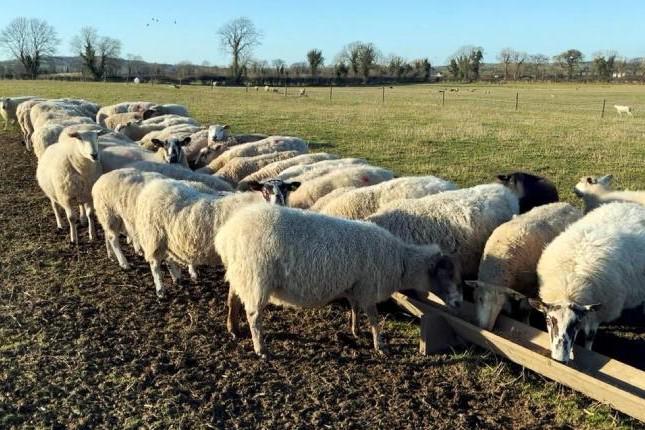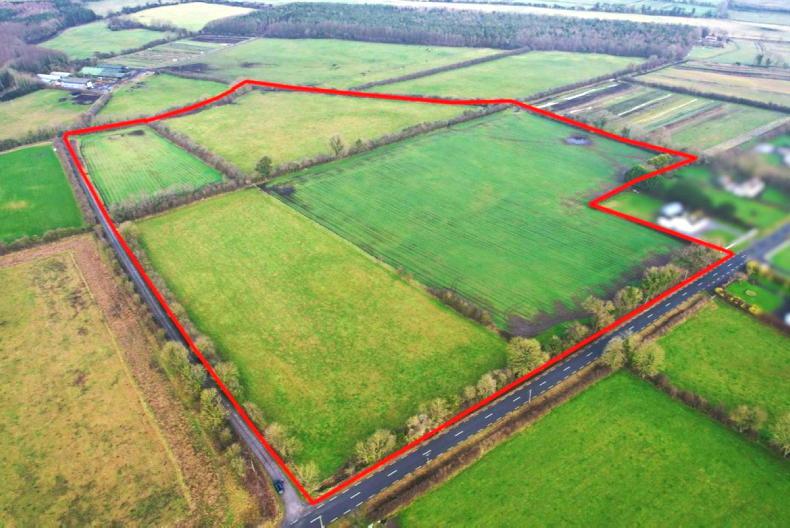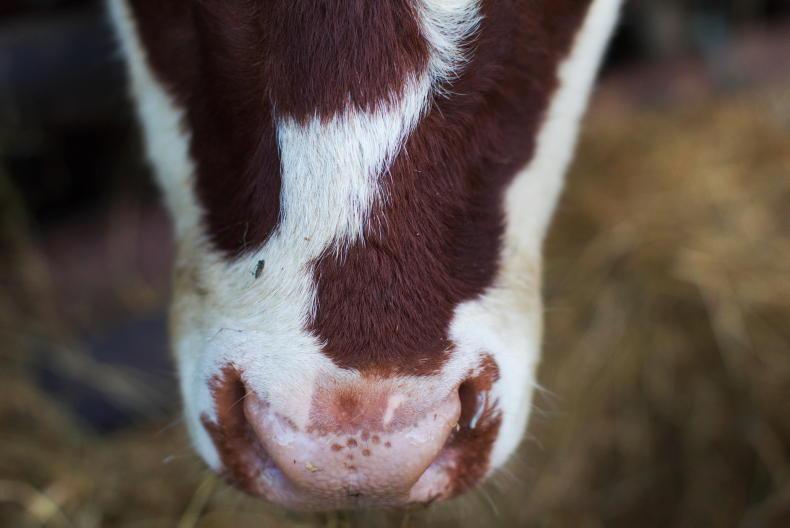When it comes to discussions on sustainable farming, it’s generally fair to say that much of the focus has been on policy and science, but less so on practice.
While terms like ‘regenerative’, ‘conservation’ and ‘biological’ farming are increasingly common, they remain poorly defined and understood.
Little wonder that when asked, Nigel Gillis, based in Grangecon, Co Wicklow, describes himself as a “mixed-up farmer”.
Spend any time with Nigel, however, and it’s clear that he’s quite the opposite.
Nigel is a second-generation farmer. His father – former IFA leader and MEP, Alan Gillis – previously farmed in Kill, Co Kildare, later moving to Grangecon. Nigel still recalls his father milking the herd at 3am in Kill, disassembling the parlour and transporting it to Grangecon where, by 11pm, it was ready for the evening milking.
Nigel helped on the home farm (now farmed separately by his brother) for 13 years before starting out on his own in the adjacent 73ha outfarm. To supplement income for his growing family (his wife Kate, a teacher, and three children) he embarked on what was to become a 30-year career as a wedding photographer. He gradually adjusted his farming system to suit, initially to beef and arable, ultimately focusing exclusively on crops.
Finding his tribe
While his “very conventional” arable system suited Nigel’s busy off-farm work life (covering up to 40 weddings a year), he recalls nonetheless that “something felt wrong”.
Costs were high, profits low and the negative impacts on nature of multiple chemical treatments were of increasing concern.
But while Nigel didn’t want to continue “chasing yields”, nor was he prepared to go organic.
Struggling to find a middle ground, Nigel’s (first) “epiphany” came during a farm walk when he heard about BASE Ireland (see box), a group of like-minded farmers who were also working to find an alternative approach.
This opened an entire pandora’s box of new ideas, approaches and connections, which he found both challenging and invigorating.
His appetite whetted. Nigel attended Groundswell and National Organic Training Skillnet (NOTS) conferences, soaking up learnings about epigenetics and insecticides (which he no longer uses, relying instead on natural pest-control methods).
He became an enthusiastic participant in the Danú EIP, which he felt “gave farmer’s power”. While the project’s final report is awaited, Nigel marvels that by year three, all 12 participants were farming 100% of their land “biologically”, having started tentatively with trials on single plots.
Nigel accepts that he could afford to explore these new ways of working, as he had off-farm income and his kids were nearing college completion.
He is acutely aware that “other lads are under savage financial pressure”, adding “a lot of farmers don’t have time to think and with regenerative you have to think for yourself, walk your own crops. Lads are right to take it slowly”.
Relentless innovation
Today, Nigel grows mostly winter and spring wheat and barley, as well as oats, beans and occasionally a pea-barley-oat combi-crop, mostly sold locally for animal feed. While conventional in this sense, his approach to growing crops, from seed to harvest, is relentlessly innovative.

Nigel Gillis at his arable holding in Co Wicklow.
He saves as much of his own seed as possible (some for over six years with six different varieties), convinced that the “epigenetics” enhance the seed’s local adaptability and performance.
Having run his own seed trials, he now dresses all his own seed (using vermi-juice from his homemade wormery, seed wash and homemade LAB (lactobacillus), with added humic).
As much as possible, he direct-drills when planting, adapting his seed drill to allow a soil biostimulant to be applied simultaneously. Nigel feels his no-till system has really improved soil structure, stability and trafficability, important factors in a hilly landscape at a time of changing climate. He uses a minimum amount of Roundup to clear off weeds pre-sowing, but never on the food crop, on principle.
To fertilise his crops, Nigel melts his own urea using an old bulk tank – mixing ammonium sulphate, fermented seaweed, epsom salts, fulvic and trace elements (a mix determined using regular sap analysis).
By applying this bespoke mix foliarly, he has consistently achieved a 50% reduction in chemical N over all the farm. An increasing number of farmers are doing this, according to Nigel.
Nigel reckons he is €260/ac under Teagasc’s projected costs for the sector in 2024.
While 2023’s weather ‘got the better of him’, in 2022 his fungicide and insecticide-free winter wheat crop got 90kg of N (down from 210kg previously) and still yielded 3.95t/ac.
He feels this system delivers better margins and resilience: as he doesn’t invest heavily in establishing crops, if they fail he uses them as cover crops, the losses aren’t huge.
The environmental dividend is also clear. Birdwatch Ireland identified 32 bird species, while Wicklow Barn Owl Group tagged three owlets bred in one of several on-farm boxes (no rodenticides are used).
‘Mixed-up’ farmer-come-scientist Nigel is a natural innovator, ever-questioning.
He is super-positive – but decidedly non-preachy – about what farmers can achieve.
“Farmers are the ones who can actually do something about our environment – small changes can make a huge difference.” Nigel’s own farming journey is certainly proof of this pudding.
Pick a small field, paddock or even a couple of tramlines and try something different. A small area failing won’t break you. And don’t be put off by negative people telling you ‘That won’t work’.
BASE Ireland hosts its annual ‘Soil Dependence Day’ on 4 July at Michael and Norman Dunne’s farm in Co Kildare. All farmers from all sectors are welcome to join. In BASE, “we all feed off one another”, says Nigel. “It’s a case of farmers educating farmers. Members are honest with their successes and failures – there’s no learning in a good crop.”
See https://soildependence.com/ for more.Name: Nigel Gillis.Farm type: arable, some forestry. Farm size: 73ha.Focus: improving profit margins and resilience.Schemes: ACRES, (formerly) DANU EIP.
When it comes to discussions on sustainable farming, it’s generally fair to say that much of the focus has been on policy and science, but less so on practice.
While terms like ‘regenerative’, ‘conservation’ and ‘biological’ farming are increasingly common, they remain poorly defined and understood.
Little wonder that when asked, Nigel Gillis, based in Grangecon, Co Wicklow, describes himself as a “mixed-up farmer”.
Spend any time with Nigel, however, and it’s clear that he’s quite the opposite.
Nigel is a second-generation farmer. His father – former IFA leader and MEP, Alan Gillis – previously farmed in Kill, Co Kildare, later moving to Grangecon. Nigel still recalls his father milking the herd at 3am in Kill, disassembling the parlour and transporting it to Grangecon where, by 11pm, it was ready for the evening milking.
Nigel helped on the home farm (now farmed separately by his brother) for 13 years before starting out on his own in the adjacent 73ha outfarm. To supplement income for his growing family (his wife Kate, a teacher, and three children) he embarked on what was to become a 30-year career as a wedding photographer. He gradually adjusted his farming system to suit, initially to beef and arable, ultimately focusing exclusively on crops.
Finding his tribe
While his “very conventional” arable system suited Nigel’s busy off-farm work life (covering up to 40 weddings a year), he recalls nonetheless that “something felt wrong”.
Costs were high, profits low and the negative impacts on nature of multiple chemical treatments were of increasing concern.
But while Nigel didn’t want to continue “chasing yields”, nor was he prepared to go organic.
Struggling to find a middle ground, Nigel’s (first) “epiphany” came during a farm walk when he heard about BASE Ireland (see box), a group of like-minded farmers who were also working to find an alternative approach.
This opened an entire pandora’s box of new ideas, approaches and connections, which he found both challenging and invigorating.
His appetite whetted. Nigel attended Groundswell and National Organic Training Skillnet (NOTS) conferences, soaking up learnings about epigenetics and insecticides (which he no longer uses, relying instead on natural pest-control methods).
He became an enthusiastic participant in the Danú EIP, which he felt “gave farmer’s power”. While the project’s final report is awaited, Nigel marvels that by year three, all 12 participants were farming 100% of their land “biologically”, having started tentatively with trials on single plots.
Nigel accepts that he could afford to explore these new ways of working, as he had off-farm income and his kids were nearing college completion.
He is acutely aware that “other lads are under savage financial pressure”, adding “a lot of farmers don’t have time to think and with regenerative you have to think for yourself, walk your own crops. Lads are right to take it slowly”.
Relentless innovation
Today, Nigel grows mostly winter and spring wheat and barley, as well as oats, beans and occasionally a pea-barley-oat combi-crop, mostly sold locally for animal feed. While conventional in this sense, his approach to growing crops, from seed to harvest, is relentlessly innovative.

Nigel Gillis at his arable holding in Co Wicklow.
He saves as much of his own seed as possible (some for over six years with six different varieties), convinced that the “epigenetics” enhance the seed’s local adaptability and performance.
Having run his own seed trials, he now dresses all his own seed (using vermi-juice from his homemade wormery, seed wash and homemade LAB (lactobacillus), with added humic).
As much as possible, he direct-drills when planting, adapting his seed drill to allow a soil biostimulant to be applied simultaneously. Nigel feels his no-till system has really improved soil structure, stability and trafficability, important factors in a hilly landscape at a time of changing climate. He uses a minimum amount of Roundup to clear off weeds pre-sowing, but never on the food crop, on principle.
To fertilise his crops, Nigel melts his own urea using an old bulk tank – mixing ammonium sulphate, fermented seaweed, epsom salts, fulvic and trace elements (a mix determined using regular sap analysis).
By applying this bespoke mix foliarly, he has consistently achieved a 50% reduction in chemical N over all the farm. An increasing number of farmers are doing this, according to Nigel.
Nigel reckons he is €260/ac under Teagasc’s projected costs for the sector in 2024.
While 2023’s weather ‘got the better of him’, in 2022 his fungicide and insecticide-free winter wheat crop got 90kg of N (down from 210kg previously) and still yielded 3.95t/ac.
He feels this system delivers better margins and resilience: as he doesn’t invest heavily in establishing crops, if they fail he uses them as cover crops, the losses aren’t huge.
The environmental dividend is also clear. Birdwatch Ireland identified 32 bird species, while Wicklow Barn Owl Group tagged three owlets bred in one of several on-farm boxes (no rodenticides are used).
‘Mixed-up’ farmer-come-scientist Nigel is a natural innovator, ever-questioning.
He is super-positive – but decidedly non-preachy – about what farmers can achieve.
“Farmers are the ones who can actually do something about our environment – small changes can make a huge difference.” Nigel’s own farming journey is certainly proof of this pudding.
Pick a small field, paddock or even a couple of tramlines and try something different. A small area failing won’t break you. And don’t be put off by negative people telling you ‘That won’t work’.
BASE Ireland hosts its annual ‘Soil Dependence Day’ on 4 July at Michael and Norman Dunne’s farm in Co Kildare. All farmers from all sectors are welcome to join. In BASE, “we all feed off one another”, says Nigel. “It’s a case of farmers educating farmers. Members are honest with their successes and failures – there’s no learning in a good crop.”
See https://soildependence.com/ for more.Name: Nigel Gillis.Farm type: arable, some forestry. Farm size: 73ha.Focus: improving profit margins and resilience.Schemes: ACRES, (formerly) DANU EIP. 









SHARING OPTIONS